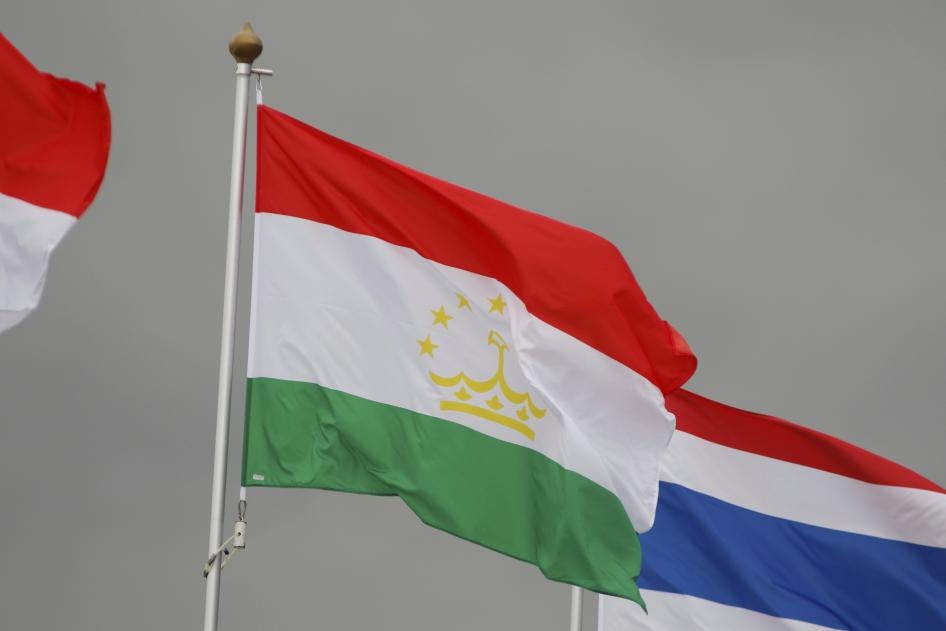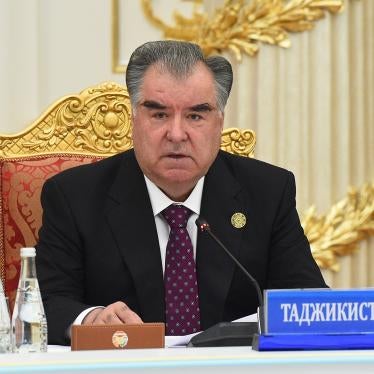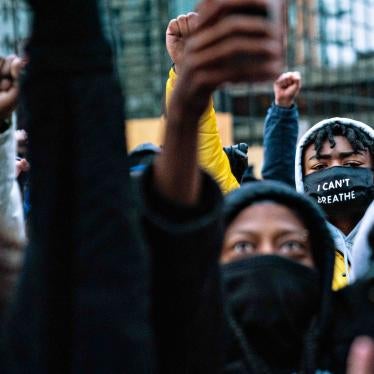(Berlin, August 23, 2022) – Dozens of residents of an autonomous region in Tajikistan detained since May 2022 protests are facing closed, unfair trials, Human Rights Watch said today. Defendants are being tried on serious charges often without access to lawyers or the evidence against them in violation of their due process rights.
The authorities have arrested and detained more than 200 people in Tajikistan’s Gorno-Badakshan autonomous region (GBAO), including at least 90 activists, on charges related to the protests and ensuing clashes. The residents of the isolated mountainous region are Pamiri, a distinct ethnic and religious minority, whom the government has long discriminated against.
“Dozens of activists and other members of the Pamiri minority in the Gorno-Badakshan autonomous region are facing unfair trials behind closed doors without access to lawyers,” said Syinat Sultanalieva, Central Asia researcher at Human Rights Watch. “Without lawyers, defendants can’t get a fair trial and are at greater risk of being tortured or otherwise mistreated.”
The International Covenant on Civil and Political Rights, which Tajikistan acceded to in 1999, provides that everyone charged with a criminal offense is entitled to a fair and public hearing, has access to counsel and adequate time to prepare a defense, and is able to examine the evidence against them.
The region has only seven lawyers who are officially registered as members of the GBAO Bar Association to cover the population of 250,000. And lawyers from other regions of the country report being warned against taking up the cases of those arrested, while others fear retaliation. Several of those charged are reported to have been forcibly disappeared from Russia and taken to the region to face trial.
The violence in the Gorno-Badakshan autonomous region began in November 2021 with protests over the killing of Gulbiddin Ziyobekov, 29, who was wanted for an alleged assault on a public official, in what the authorities claimed was a shootout during a law enforcement operation.
Following a government crackdown in the region, protests began again in May. The Tajik authorities contended that the protests were illegal because they were organized by criminal groups with connections to terrorist organizations. The media at the time reported that the police violently dispersed the protesters using rubber bullets and teargas with military support deployed from the capital, Dushanbe.
The authorities then undertook a special “anti-terrorism operation” in the region, which, according to the United Nations special rapporteur on minority issues, may have resulted in the killing of as many as 40 people, with 46 arrested as “militants.” The special operation lasted nearly a month, and three influential figures in the region were killed – Mamadboqir Mamadboqirov, Zoir Rajabov, and Khursand Mazorov – whom the authorities claimed were “leaders of criminal gangs.” Muslim Sherzamonov, brother of Alim Sherzamonov, a fugitive opposition politician wanted for allegedly organizing the May protests, was also arrested as part of the special operation. On July 29, Muslim Sherzamonov was sentenced to 18 years in prison on charges of “participation in activities of a criminal group.”
Seven members of “Commission 44,” an independent group established in late 2021 to investigate Ziyobekov’s death, were arrested and are among those being detained. On June 30, a court sentenced two members of Commission 44, Shaftolu Bekdavlatov and Khujamri Pirmamadov, to 18 years in prison on charges of organizing a criminal association and receiving financial assistance from abroad.
The other members of the group being detained include Manuchekhr Kholiknazarov, head of the Association of Lawyers in Pamir; Faromuz Irgashov, a lawyer who heads Commission 44; and Khursand Mamadshoev, brother of detained activist and journalist Ulfatkhonim Mamadshoeva. All are charged with “participation in a criminal association” under article 187 of the Criminal Code of Tajikistan. Mamadshoeva’s own trial is ongoing, with the state prosecution requesting 25 years in prison for her and a life term for her former husband, Kholbash Kholbashov, for allegedly conspiring against the state and organizing the May protests.
At least seven of those detained had been abducted or forcibly returned to Tajikistan from Russia in June and July without rights protections. All were active members of the Pamiri diaspora in Russia who had expressed critical views of the Tajik government’s handling of the November and May protests.
Oraz Vazirbekov and Ramzi Vazirbekov, two unrelated men who are both Russian citizens, were reported missing at Moscow’s Domodedovo airport on July 29. They reappeared in a televised speech in Tajikistan in which they said they had returned to Tajikistan voluntarily to assist the official investigation into the events leading to the November protests. Previously, Oraz Vazirbekov had expressed fears of being kidnapped by the Tajik special services. Their current whereabouts have not been revealed and they are believed to be forcibly disappeared. Three other activists from the Pamiri diaspora in Russia who were forcibly returned to Tajikistan are Jonibek Chorshanbiev, Muslim Navruzov, and Ruslan Pulodbekov.
Earlier in 2022, two other influential figures within the Pamiri diaspora – Amriddin Alovatshoev and Chorshanbe Chorshanbiev – were forcibly returned from Russia to Tajikistan and detained. On May 13, Chorshanbiev was sentenced to 8½ years in prison on charges of “public calls for violent change of the constitutional order” under article 307 of the Criminal Code. Alovatshoev was sentenced to 18 years in prison for an array of unspecified criminal charges.
On July 7, the European Parliament adopted a resolution calling on the Tajik authorities to immediately set up an effective and independent investigation into the violent clashes in the region during and after the November 2021 and May 2022 protests, in particular the use of force by law enforcement officials, the deaths of protesters, and alleged torture by the security forces. The resolution calls for the immediate release of arbitrarily detained human rights defenders, journalists, and civil society activists.
On June 13, Genocide Watch, which coordinates an alliance of over 90 organizations focused on preventing genocide, issued a warning on Tajikistan outlining the government’s increased surveillance, detention, and persecution of the ethnic Pamiri in the region.
“The Tajik courts have become a conveyor belt for churning out lengthy prison terms without due process for anyone linked to the May protests,” Sultanalieva said. “The Tajik authorities need to stop this injustice and uphold their international obligations to end wrongful detentions and to ensure fair trials.”








